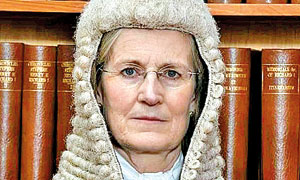News
UK High Court acquits Lanka’s defence attache; upholds diplomatic immunity
View(s):The UK High Court of Justice that overturned the verdict of a Chief Magistrate and acquitted Sri Lanka’s then Defence Attache at the High Commission in London has held that it goes on the premise that the Government of Sri Lanka would not have commissioned or condoned the behaviour of the Brigadier concerned but that he had performed his role in his official capacity “despite the criminality” of the act.

Westminster Court Chief Magistrate Emma Arbuthnot
Brigadier Priyanka Fernando who was serving at the SLHC was convicted of committing a criminal act of a threatening “throat-cutting” gesture towards pro-LTTE demonstrators outside the mission building in 2018 on Sri Lanka’s Independence Day.
The Queens Bench Division presided over by Sir Julian Flaux, Chancellor, and Mrs. Justice McGowen rejected the Chief Magistrate’s “crucial question” — whether the act not being in the ‘Job Description’ of the diplomat, he was, therefore, entitled to diplomatic immunity.
The Bench held that it was unlikely such acts would end up in ‘Job Descriptions’ of any diplomat as much where diplomats engage in espionage certainly not being in the ‘Job Description’ of a diplomat.
The Court held that the Brigadier was in uniform on the steps of the High Commission and the act of a threatening gesture does not take away his diplomatic immunity under the Vienna Convention on Diplomatic Relations (VCDR).
 The order referred to concerns the invidious effect on British diplomatic agents abroad who could be at risk if they commit unlawful acts without instructions.
The order referred to concerns the invidious effect on British diplomatic agents abroad who could be at risk if they commit unlawful acts without instructions.
It pointed out to the residual immunity of a diplomat and drew the distinction between a diplomat acting in his personal capacity and his official capacity (quadiplomat) and held that the Brigadier was acting clearly in the latter.
The Chief Magistrate was not right to determine the actions Brigadier Fernando performed while he was a diplomat were outside the functions of the mission and therefore not covered by residual immunity.
The Bench held that the question they went into was not whether the officer concerned committed an offence under the (UK) Public Order Act, but by virtue of residual immunity, he was protected from prosecution for the offence.
It stated that the Government of Sri Lanka did not waive that protection in this case.
The Brigadier having returned to Sri Lanka was convicted in absentia by the Chief Magistrate on January 21, 2019 upon a complaint made by Majuran Sathanathan, but on March 15, 2019 the Magistrate set aside the conviction as it had not been aware of the Brigadier’s diplomatic immunity status. The Magistrate then re-convicted the Brigadier at a subsequent hearing stating that throat-cutting gesture was not in the ‘Job Description’ of the diplomat.
The appeal to the High Court was limited on one single question formulated by the Chief Magistrate; “Was I right to determine that the action he performed, whilst he was a diplomat, was outside the functions of the mission and therefore not covered by residual immunity when the defendant stood trial?”
The bench went into the question of whether the Chief Magistrate was “wrong in law”. The order referred to the Diplomatic Privileges Act 1964 under the VCDR, “the cornerstone of modern international order” as stated by Professor Denza in the leading textbook Diplomatic Law. It also went into judgments in the UK courts, including that of Lord Bingham, Chief Justice, on diplomatic immunity in the former Chilean President Pinochet’s case.
Submissions were conducted by remote hearing on December 20, 2020. Brigadier Fernando now can make submissions on costs. He said he did not want to make any comment on the order.
Mr. Hugh Southey QC and Mr Nick Wayne instructed by Ronald Fletcher Baker appeared for Brigadier Fernando. Mr. Peter Carter QC with Ms. Shanthi Sivakumaran instructed by the Public Interest Law Centre appeared for Mr. Sathananthan.
(Click visit full text of the judgment).


